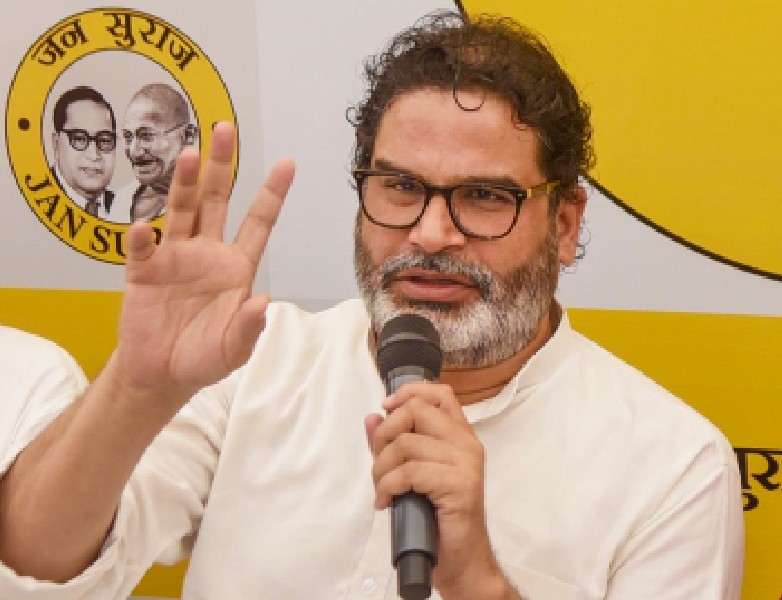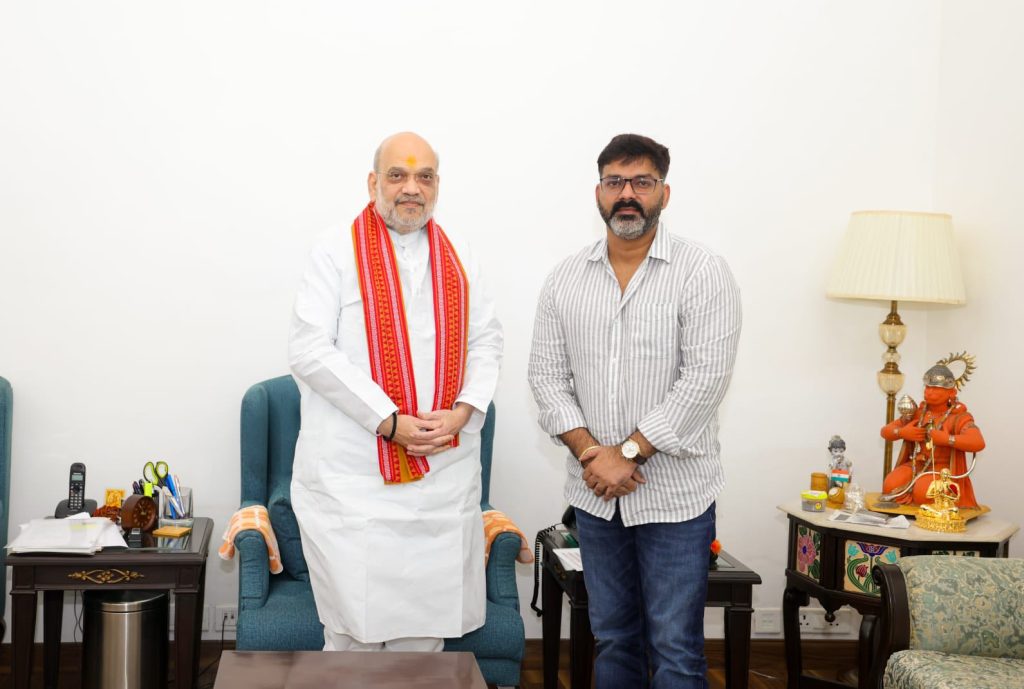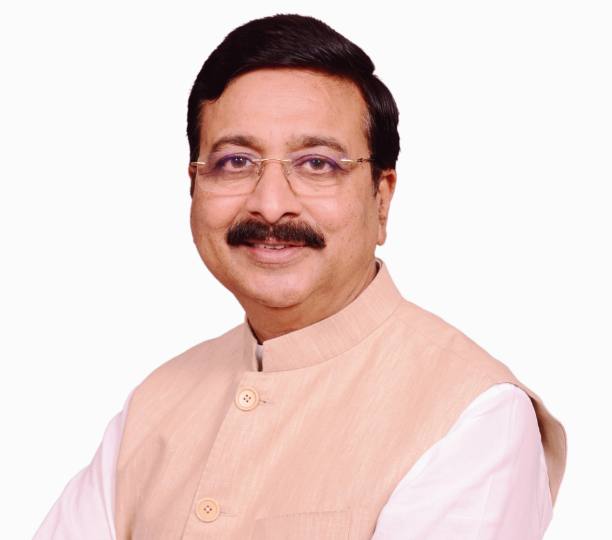Tridib Raman
From the stale winds of the national capital, Delhi, layers of smoke from the Ravana Dahan festivities have dissolved into the monsoon rains. A new, radiant day has dawned, and amid such an atmosphere, the saffron party is giving final shape to several crucial decisions. The occasion also marks the centenary year of the RSS, so it’s said that when Sarsanghchalak Mohan Bhagwat and Prime Minister Modi sat down for an important conversation, many long-tangled threads in their relationship began to unravel. The RSS had been complaining that the Prime Minister doesn’t openly praise the organization enough, to which the PM, in recent days, has responded by weaving several new tributes in its honour. On the other hand, BJP’s pain was that the Sangh could not wholeheartedly accept its every decision; Bhagwat has now effortlessly resolved this puzzle. Bhagwat has made it clear to the BJP that “they are completely free to choose their new president. RSS will have no interference in that matter.” Reliable sources close to the RSS reveal that the Sarsanghchalak put forward just one condition before the BJP: “Until the party elects its new president, the current president, J.P. Nadda, must refrain from making major organizational decisions. For now, he must rely on the party’s Parliamentary Board, which, in turn, will function under a collective leadership model.” Recently, Gujarat has got a new state president and Jharkhand a new working president; it’s believed that the BJP leadership sought collective consensus on these appointments as well. Sources say that during his conversation with the RSS chief, the BJP’s top leader clearly stated that “only after the month of Malmas-Kharmas, in the new year, around Makar Sankranti, that is, after January 14, will the BJP announce its new national president.” It is said that this idea, too, has received the quiet approval of the RSS leadership.
Why is PK so Aggressive Towards the BJP?
Tridib Raman

Having nurtured his political ambitions in the lap of saffron aspirations, how has Prashant Kishor suddenly become so aggressive towards the very same party? And that too at a time when he has consistently faced allegations of acting as the BJP’s ‘B-Team’. PK himself also believed that his relationship with the BJP’s top leadership was somewhat cordial, but the entire game flipped when the central government targeted not just PK, but also his wife’s NGO. A trusted source close to PK claims that about two weeks ago, PK was served a notice by the Income Tax Department. He had barely recovered from this shock when the central government targeted the NGO run by his wife. Sources claim that not only were the managers of the NGO served notices by the Income Tax Department, but the organization’s office was outright raided. This is what offended PK deeply. He asks, ‘What does his wife have to do with his political ideology or activities? She has barely visited Bihar three or four times.’ It is said that it was after this government action that PK declared war on the BJP. His announcement of a ‘no holds barred’ approach is also being viewed in this context.
How did Pawan’s Mind Change?
Tridib Raman

The famous Bhojpuri singer and actor, Pawan Singh, probably never found the saffron tune agreeable, but in a changed scenario today, he has taken hold of the BJP’s mantle, and there is widespread talk of him contesting elections from Ara on the lotus symbol. Trusted sources reveal that the free-spirited Pawan wanted to initiate a politics of optimism in Bihar. He saw potential in Jan Suraaj’s chief, Prashant Kishor, to write a new chapter of change-oriented politics. So, upon returning to Patna, he first went to meet Prashant Kishor and requested that ‘if Jan Suraaj declared him their CM face in Bihar, he would travel across the entire state to build a wave in the party’s favour.’ At that time, PK did not make any promise to Pawan because he has long been associated with Uday Singh a.k.a. Pappu Singh, the former MP from Purnea. Pappu belongs to a major political family in Bihar; his brother N.K. Singh is considered among PM Modi’s closest confidants. Jan Suraaj’s National President, Uday Singh, has supported PK in every way; like Pawan Singh, he also boasts of representing the state’s Rajput community. Things were fine up to this point. After meeting Pawan, PK, in a moment of indiscretion, made some unflattering remarks about Pawan to a journalist close to him. When Pawan Singh learned of this, he was enraged. He went straight to Upendra Kushwaha, and speculation began that he would enter the fray with Kushwaha’s party. Meanwhile, Upendra Kushwaha received a message from the BJP’s Chanakya, Amit Shah, asking him to ‘arrange a meeting with Pawan Singh’. Upendra Kushwaha took Pawan and went to meet Amit Shah. In a short conversation, the Chanakya won over the Rajput pride, and it was announced that ‘Pawan would now contest from Araah on the lotus symbol.’ The BJP’s Chanakya was well aware that by winning over Pawan Singh alone, the party could gain an advantage on 22 assembly seats in the Bhojpuri belt of Bhojpur, Buxar, Kaimur, Rohtas, and Shahabad.
Haryana Congress’s Leadership Tussle Ends with a Compromise

After considerable upheaval, tug-of-war, and wrestling, the Haryana Congress has finally found a new state president in Rao Narendra Singh, replacing Bhupinder Singh Hooda. The core of the issue was that Bhupinder Singh Hooda was willing to vacate his presidential chair only on the condition that ‘the party would choose his preferred candidate, Captain Ajay Yadav, in his place.’ However, senior leaders like Kumari Selja and Randeep Surjewala were opposing Captain Ajay’s name. They argued that ‘instead of handing the state’s leadership to a Yadav leader, it should be entrusted to a Punjabi leader.’ This was because Hooda, after stepping down as president, was set to become the Congress Legislative Party (CLP) leader, a move that had already been prepared to safeguard ‘Jat self-respect’. The two names Selja put forward from her side were problematic: one had lost the recent election, and the other held little political weight. Since Rahul Gandhi had already left for his US tour, Hooda went straight to meet Sonia Gandhi to resolve the matter. He told her, “If we listen to Selja Ji, then why did we lose in areas like Kurukshetra and Karnal, which have a dominance of Punjabi voters? As for the Jats, they have openly supported us on every seat. That is why, to protect Jat self-respect, it is essential for me to become the CLP leader. You can make any neutral leader the President.” It was under this compromise that the name of Rao Narendra Singh emerged. When Selja and Surjewala opposed his name as well, Priyanka Gandhi summoned both leaders and gave them a stern talking-to. Only then was the path cleared for Narendra Singh and Hooda.
Yogi Remains Unconvinced

On the 25th of September, Dharmendra Pradhan was announced as the in-charge for the Bihar Assembly elections, with Keshav Prasad Maurya and C.R. Patil as co-in-charges. The matter of appointing an in-charge had been pending for a long time. According to sources, the BJP top brass wanted Uttar Pradesh Chief Minister Yogi Adityanath to take charge as the election in-charge for Bihar. Yogi was reportedly offered that ‘as the in-charge, he would be free to take independent decisions regarding Bihar’s affairs, but he would also have to manage the electoral finances there.’ The BJP leadership hoped that Yogi, with his direct rhetoric, would be capable of polarizing votes in Bihar. They believed that if the election could be centered around communal polarization, nothing would stop the BJP alliance from winning. However, to their surprise, Yogi flatly refused this proposal from the top. His argument was that ‘if he got entangled in elections for so many days, his focus might shift from UP, and administrative decisions here could get delayed.’ After this, to put Yogi in his place, the BJP top brass chose his staunch rival, Keshav Prasad Maurya, and sent him to Bihar, but they did not take the risk of giving him full responsibility.
What Was Rahul Apprehensive About?
Before departing for the four-nation South America visit, Leader of the Opposition Rahul Gandhi had called an important meeting of the Congress Core Committee. In that meeting, Rahul had stated openly: “You will see that no matter what issues we raise, be it ‘vote theft’ or ‘American pressure’,many people from within our own party will speak against them. Because I know that one-third of the people in our party are working for the BJP.” While Rahul’s hint was actually towards Manish Tewari and his group, it was Chidambaram who ended up speaking out. Furthermore, Rahul instructed Bihar’s Congress in-charge, Krishna Allavaru, saying, “Find out which castes the 69 lakh people, whose names have been cut from the voter list in Bihar, belong to. My estimate is that most of them are Dalits or Mahadalits.” Allavaru replied, “This list is so large and time is so short, it will be difficult to find out. Nevertheless, we will try our best.” Rahul insisted, “This can be a major electoral issue that names of selective castes have been cut from the voter list. We must travel across Bihar and tell this to the people.” Allavaru has since immersed himself diligently in this task.
Has Prashant Kishor Fallen into Bihar’s Caste Trap?
Prashant Kishor, who once claimed to light the torch of an optimistic and new kind of politics in Bihar, now seems to be getting caught in the quagmire of the state’s caste-driven politics. Otherwise, what explains the fact that in regions like Bhojpur, Shahabad, Buxar, and Karakat, the posters, banners, and stickers of his Jan Suraaj Party prominently display his full name, Prashant Kishor Pandey, with his surname printed in bold letters? It appears that PK, too, has blown the conch of caste polarization in Bihar’s political arena for the sake of his own party.